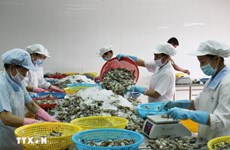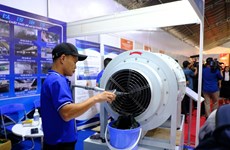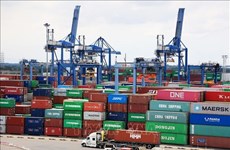Economists call for new model for global integration
Low tech production and exports largely
based on natural resources aroused concerns from economists at a
workshop held in Hanoi on May 24, who called for new model of
economic development after three years joining the World Trade
Organisation.
Low tech production and exports largely
based on natural resources aroused concerns from economists at a
workshop held in Hanoi on May 24, who called for new model of
economic development after three years joining the World Trade
Organisation.
The Director of the Vietnam Economics Institute, Tran Dinh Thien, said raw materials such as minerals and farm and forest products and seafood are major hard currency earners while industrial exports such as apparels, leather shoes, electronic appliances and computers are essentially subcontracted products with low added values.
Raw materials and low-tech products make up almost 82 percent of the gross export value, excluding crude oil.
Thien said the three years of joining WTO, especially 2009 which culminated with a global crisis, was a “test” for the national economy in global integration, examining the Government’s capacity to cope with risks.
“It is urgent now to build a new model of economic development to meet the emerging demand for global integration,” said the senior economist.
His view was echoed by former Deputy Prime Minister Vu Khoan, who warned that unless the Government worked out a new model to correct the weaknesses, the national economy could not compete on the global scale.
Khoan pointed out the weaknesses that need to be changed for successful integration, including poor quality of growth which has largely depended on investments, low competitive capacity, a poor legal system, backward infrastructure and poor human resource quality.
Prof. Nguyen Mai, former member of the Government’s Research Board, shared his view, urging for a new Governmental integration programme to include concrete measures and strategies for each and every partners and industries.
In regard to the foreign direct investment (FDI) strategy, the Government should be selective instead of opening the economy for all partners as at present.
The Government should ban all FDI projects on export-oriented mining projects or environmental polluters, he said.
The FDI policy should give a hand to domestic investors by setting up international production and marketing systems to help them develop on the global scale.
The Central Institute for Economic Management Research recently reported that global integration process, especially the country’s WTO membership, has made a positive impact on the Vietnamese economy.
The nation’s economic growth, at just 5.3 percent in 2009 due to global financial crisis, was still ranked a high level as many other economies posted much lower or even minus rates.
Global integration has also helped Vietnam expand foreign markets, speed up exports, increase the inflow of FDI, perfect the legal system on market-oriented economy, generate more jobs, alleviate poverty and increase access to input sources for businesses.
The workshop on socio-economic impacts three years after the country joined the world’s largest economic body drew almost 260 participants from the offices of the Government and National Assembly, different ministries, industries and local administrations./.
The Director of the Vietnam Economics Institute, Tran Dinh Thien, said raw materials such as minerals and farm and forest products and seafood are major hard currency earners while industrial exports such as apparels, leather shoes, electronic appliances and computers are essentially subcontracted products with low added values.
Raw materials and low-tech products make up almost 82 percent of the gross export value, excluding crude oil.
Thien said the three years of joining WTO, especially 2009 which culminated with a global crisis, was a “test” for the national economy in global integration, examining the Government’s capacity to cope with risks.
“It is urgent now to build a new model of economic development to meet the emerging demand for global integration,” said the senior economist.
His view was echoed by former Deputy Prime Minister Vu Khoan, who warned that unless the Government worked out a new model to correct the weaknesses, the national economy could not compete on the global scale.
Khoan pointed out the weaknesses that need to be changed for successful integration, including poor quality of growth which has largely depended on investments, low competitive capacity, a poor legal system, backward infrastructure and poor human resource quality.
Prof. Nguyen Mai, former member of the Government’s Research Board, shared his view, urging for a new Governmental integration programme to include concrete measures and strategies for each and every partners and industries.
In regard to the foreign direct investment (FDI) strategy, the Government should be selective instead of opening the economy for all partners as at present.
The Government should ban all FDI projects on export-oriented mining projects or environmental polluters, he said.
The FDI policy should give a hand to domestic investors by setting up international production and marketing systems to help them develop on the global scale.
The Central Institute for Economic Management Research recently reported that global integration process, especially the country’s WTO membership, has made a positive impact on the Vietnamese economy.
The nation’s economic growth, at just 5.3 percent in 2009 due to global financial crisis, was still ranked a high level as many other economies posted much lower or even minus rates.
Global integration has also helped Vietnam expand foreign markets, speed up exports, increase the inflow of FDI, perfect the legal system on market-oriented economy, generate more jobs, alleviate poverty and increase access to input sources for businesses.
The workshop on socio-economic impacts three years after the country joined the world’s largest economic body drew almost 260 participants from the offices of the Government and National Assembly, different ministries, industries and local administrations./.













